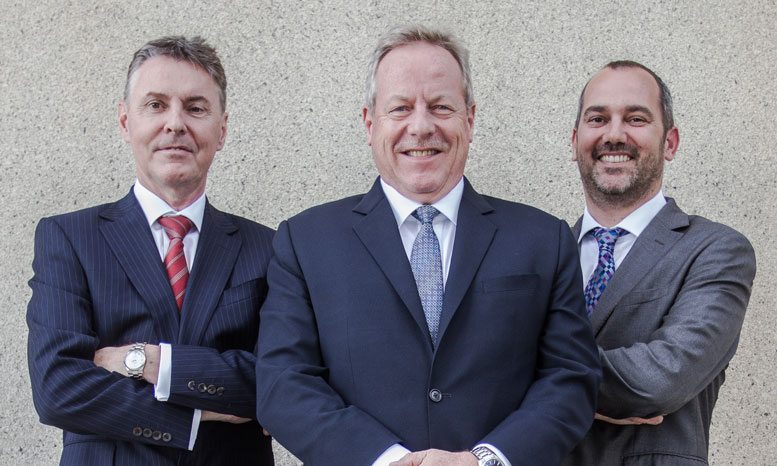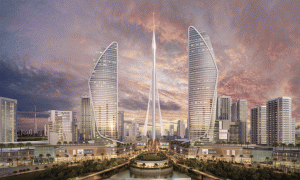Custodians of cost: Omnium execs survey the Mideast QS scene
Omnium International is keen to expand its reach and create long-term partnerships with its client base in the UAE and Saudi Arabia

As is evident to anyone in the industry, quantity surveying is a vital function and the QS is a key and integral member of any construction team. Broadly speaking, professional quantity surveyors manage inter alia, all costs relating to building and civil engineering projects, from the initial estimates, projections and calculations to the final account. They seek to minimise and optimise the expenditure on a project, exercising due diligence on expenditures, provide oversight and deliver value-for-money services, while attaining the required standards and expected quality.
Omnium International acquired prominence as the mega-tall building experts in the QS industry due to its involvement with some of the biggest and tallest landmark buildings in the region. These include the Burj Khalifa (currently the tallest building in the world); the Kingdom Tower in Jeddah (aiming to outdo the Burj Khalifa when completed) and most recently The Tower at Dubai Creek Harbour, which is set to surpass the Burj Khalifa when completed in 2020. When The Tower is commissioned, Omnium will be the only QS firm to have worked on three out of the four mega-tall buildings in the Middle East and among the top nine in the world.
“Our master-planning portfolio is very impressive and our firm has been extensively involved in the building of modern Dubai. We have been Quantity Surveyors for the construction of much of Downtown Dubai and the associated infrastructure works, the Dubai Marina, Arabian Ranches, the Mohammed Bin Rashid City – Dubai Hills Estate and the Dubai Creek Harbour developments,” affirms Peter Westeng, Dubai based Managing Director of Omnium International, a 35-year industry veteran who has worked on many major international projects and has been a Dubai resident for over 21 years.
Westeng sees Omnium International’s role not just related to cost but to manage the comprehensive contractual relationships between the various parties involved in any particular building project and to ensure that all parties adhere to their contractual obligations. “As an independent firm, Omnium International endeavours to be more than just a QS consultant and on each project we strive to enter into a partnership with our client and to safeguard their interests at all times,” he asserts.
Omnium International provides full QS services to its clients, from the earliest inception stages of a project, right through to completion. “We work closely with our clients’ development and project delivery teams and offer commercial and contract management throughout the course of a project. We also work closely with the client’s finance, audit and legal teams and specialize in preparing customised contract documentation to suit the client’s needs,” he adds.
“Not only do we specialize in mega-tall structures but we have a full range of end-to-end project experience in high and low rise residential, hospitality, retail, education, healthcare, exhibition centres and have worked on some of the most iconic, record-breaking, world’s first projects in the region.”
Contractual knowledge, specialty in drafting, administering and extensive experience in managing construction costs and contracts are among Omnium International’s strengths according to Westeng. He added that “we don’t have a high turnover of staff and have a true ability to retain staff, many of whom have worked for us for periods in excess of 10 years. Retaining staff is we believe the key to success of any professional practice. We consider it very important that our clients see continuity of experience and knowledge in our staff”.
Middle East: Fast-paced and demanding
The time demands placed upon the QS and indeed all consultants in the region are extreme; with the pace at which consultants are appointed, designs are completed and buildings built being pushed to the limit, asserts Terry Smith, a Dubai-based Director of Omnium International, who has worked on many projects throughout the region. “Although most construction projects worldwide will be fast paced, we believe that time demands on projects in this region and Dubai in particular are more so,” he remarks.
Complexity is another factor that distinguishes the Middle East in Smith’s analysis. “Clients’ aspirations to be the best in the world often means that their ambitions extend beyond the conventional. Many concepts are so pioneering that there is no existing benchmark to reference and we relish the challenge,” he explains.
“Not many regions can offer the scale of diverse and prestigious projects that the Middle East can offer, Dubai in particular is an architect’s playground and the budgets that go with it are beyond what many of us could ever imagine working on,” continues Smith.
The QS is often seen as the more pragmatic and responsible side of the construction industry and is often referred to as the ‘bean counter’, but Omnium International is pleased that the Quantity Surveying industry is attracting fresh talent and many young people are gravitating to the profession. Smith indicated that the company commenced a graduate programme over the last couple of years and this has proved to be extremely useful as these young recruits bring with them a wealth of new skill sets and offer different strengths.
More Mature Market
“Omnium is immensely proud to have been appointed cost consultants for Expo 2020’s Sustainability and Mobility Pavilions and to be involved in such a pioneering and demanding development in the Middle East,” declares Nicholas Harris, another Dubai-based Director at Omnium International, who heads up Omnium’s infrastructure and commercial projects in Dubai and is the Director responsible for all of Omnium’s work on Emaar’s new major development projects.
“Omnium International’s involvement in their current and past projects such as the iconic Expo 2020 UAE Pavilion designed by the renowned award-winning Swiss-Spanish architect Santiago Calatrava; the Arabian Ranches; the Dubai Mall, the largest retail mall by area in the world; the Burj Khalifa, the One Za’abeel mixed use development that will feature the world’s largest cantilevered structure, the Dubai Creek Harbour Development and The Tower, are clear illustrations of Dubai’s ability to build outstanding, world class designed and engineered buildings and developments,” observes Harris.
The intensity of the review by the client in respect of costs, value engineering, value management and whole life cycle costing demonstrates that there is definitely now a requirement from the developer to understand and be able to interrogate costs associated with its development and Harris insists that there is no question that the construction industry is now considerably more mature than it was 20 years ago, when he first started working in the region.
Technology trends
Technologies such as Building Information Modelling (BIM) are changing the way the construction industry operates notes Harris. “From the QS perspective it has the promise to allow us to produce key deliverables quicker that if we had used previous methods. There are always the reservations that a BIM model is only as good as the purpose it was intended for and we still need to carry out the due diligence and bulk checks to ensure that the model itself is complete and can be used reliably,” he adds.
The majority of our projects that we work on are extremely complex, that is typical of the clients that we work for, comments Harris. “They are pioneering projects and they push the limits for everyone involved whether it be from a consultant’s perspective to the builder’s perspective. The complexity of the Burj Khalifa changed the face of construction, no one had ever built a building of that height before, when we were appointed at the very early feasibility stage we realised the complexities of determining the most appropriate procurement route and the requirements for the appointment of key consultants.”
“We have a passion to be appreciated by our clients and our challenge is to make sure that we evolve with our client’s needs. Dubai is a city that has shown stunning growth over the last 20 years, an incredible achievement, every one of our projects pushes us to find a way to deliver for our clients and to think creatively,” emphasises Harris.
“Omnium International’s track record has been exemplary, we are well-regarded and have extensively contributed to several landmark projects over the past over 20 years. We were the Quantity Surveyors on the first Dubai Marina earthworks and key wall project and witnessed the marina being ‘slowly’ filled with water and were privileged to be invited to attend the ground breaking ceremony for the Burj Khalifa,” Smith recounts.
With so much on hand and a fine reputation to uphold, the Omnium team have their work cut out for them. Optimisation is the key and as clients ply pressure with their ground breaking and pioneering projects, Omnium International is called to meet requirements and prove itself over and over again. “We have an ambition to grow the company in the region but believe this growth will be measured and cautious as we focus on ensuring quality of our service to our existing clients,” Westeng admits.
It would seem, given its credentials and longevity in the business, that Omnium International are worthy recipients of the Middle East Consultant Award for Cost Consultancy Company of the Year for 2 years running!
Omnium origins
The UAE and more recently Saudi Arabia are the nerve centres of Omnium and ties in the region are deep-rooted. Omnium really took off in 1979 with Dubai Aluminium (DUBAL), when current chairman Bob Cawkwell was the Chief QS on the original aluminium smelter project. The company was subsequently appointed on DUBAL’s various expansion projects and in 1997, through their reputation at DUBAL, Omnium were asked to assist in Emaar’s early development projects.
Omnium’s growth has stemmed from this close relationship with Emaar and has led the company to work with other major developers such as Investment Corporation of Dubai (ICD), Tourism Development & Investment Company in Abu Dhabi; Dubai Multi Commodities Centre; Emaar Middle East and Jeddah Economic Company in Saudi Arabia.





